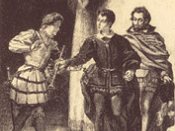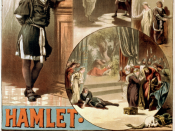Antiheroism has always been an interesting aspect of a character that authors have chosen to illustrate. In literature, there has been countless antiheroic characters, from Randle McMurphy in One Flew Over the Cuckoo's Nest and Allie Fox in The Mosquito Coast, to others as famous as Robin Hood and ... By literary definition, an antihero is the "hero" of the play or novel, but has negative attributes which separate him or her from the classic hero such as Superman. Such negative aspects may include a violent nature, use of coarse language, or self serving interests which may inadvertently depict the protagonist as a hero since the result of serving those interests may be the betterment of society or an environment. In William Shakespeare's Hamlet, the protagonist, Hamlet, is depicted as an antihero. One main factor which gives Hamlet such a label is that he draws sympathy, as well as admiration, from the reader since Hamlet feels the pain of losing his father along with the burden and obstacles in avenging his murder.
Act four places a special emphasis on Hamlet's intelligence. In scene two, Hamlet is very insolent and rude towards Rosencrantz and Guildenstern with such phrases as, That I can keep your counsel and not, mine own. Beside, to be demanded of a sponge, what replication should be made by the son of a king? (IV, ii, 12-14) The reference to the sponge reflects the fact that Rosencrantz and Guildenstern are easily ordered by the king and do not have minds of their own. Hamlet does not like Rosencrantz and Guildenstern since they are servants of the Claudius, Hamlet's mortal enemy. The reader does not like Rosencrantz and Guildenstern either which causes the reader to side with Hamlet.
Another incident of Hamlet's high intelligence is shown when he Hamlet...


